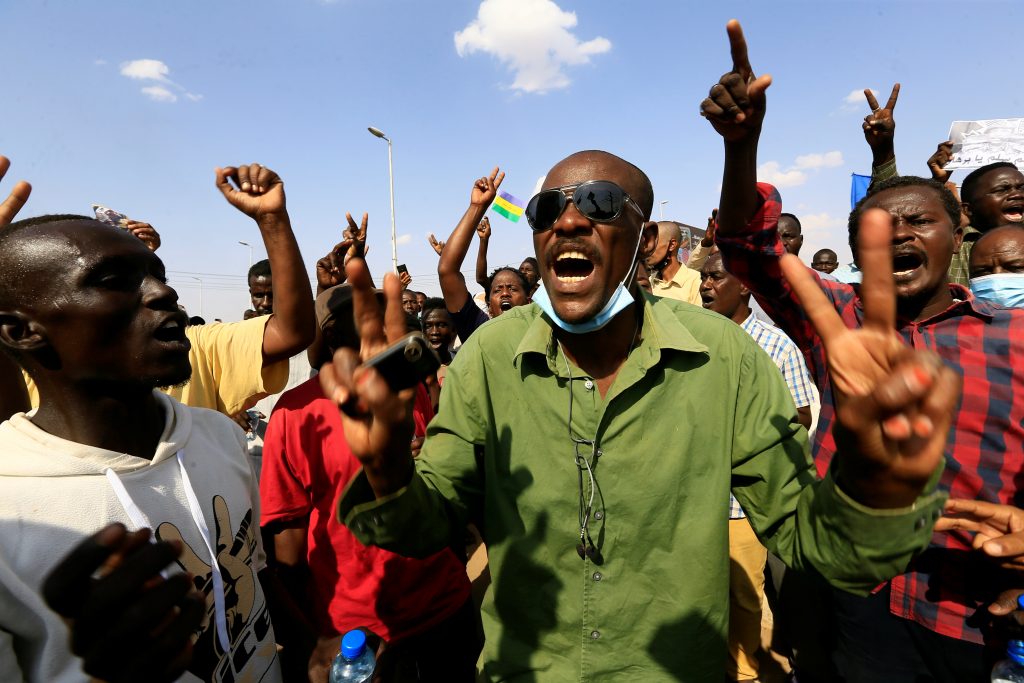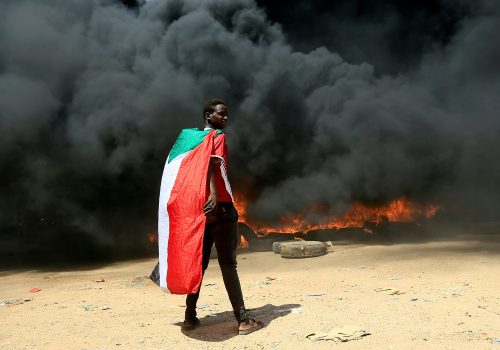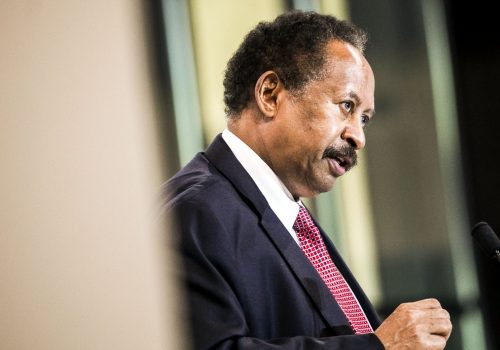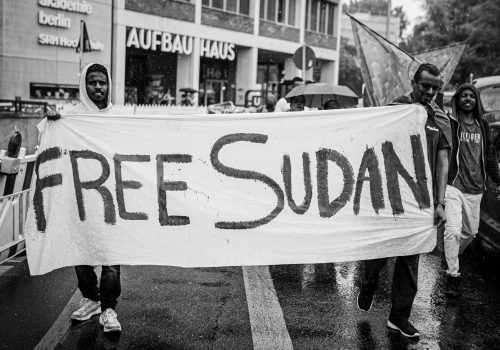US diplomats had barely cleared Sudanese airspace when the country’s military began deploying across the capital, Khartoum, in the early hours of Monday and rounding up the civilian leaders it believed betrayed the democratic revolution that toppled long-time dictator Omar al-Bashir in 2019.
By Monday morning, a state of emergency had been imposed, Prime Minister Abdalla Hamdok was detained, and critical parts of the country’s transitional constitution were suspended.
Since June, Hamdok, a civilian technocrat, had been warning about exactly this turn of events. In perhaps its most transparent act of its takeover, the military had even signaled to observers at home and abroad that a coup d’état remained a lifeline of last resort, as pressure mounted on the military to transfer its chairmanship of Sudan’s Sovereignty Council to civilian leadership. That message came in the form of a foiled coup attempt earlier this month which many observers viewed as a trial balloon to test local and international reaction.
The response could not have been more clear: International envoys descended on Khartoum, warning of aid suspensions, targeted sanctions, and delays in international assistance on critical needs such as debt relief.
The public’s response was equally swift and clear. More than one million pro-democracy protesters took to the streets across Sudan. Demand for civilian rule hasn’t dimmed since 2019. If anything, military efforts to blame civilian leaders for the slow implementation of reforms and sclerotic economic progress have failed—instead fueling demand for democratic governance as the only way out of the country’s morass.
The only surprise from this week’s development is the timing—coming just hours after Sudan’s military head of state assured US Special Envoy for the Horn of Africa Jeffrey Feltman that he remained committed to the core tenets of the transition to civilian rule, and was prepared to work cooperatively with Sudan’s fractious political parties to advance the most controversial and unimplemented aspects of the transitional charter.
That promise unraveled quickly.
New realities in Africa
Few could argue the United States was insufficiently engaged in Sudan, or that it hadn’t brought its highest-level actors to bear on the events leading up to the coup. Between multiple visits from Feltman and high-level calls from both National Security Advisor Jake Sullivan and Secretary of State Antony Blinken, Washington has rarely been as coordinated and consistent in its message as it has been with Khartoum.
Instead, this may reflect a new era for US diplomacy in Africa—one in which the United States is one of many powerful actors vying for influence to shape political outcomes. In a context where Washington’s voice is diluted amid competing powers, Sudan has emerged as the ultimate battleground. Although Sudan has always sat at a strategic crossroads, the revolution has re-shuffled the political deck in the country, and opportunity has emerged for new global players eager to exploit more than just the country’s rich gold deposits or strategic location.
Egypt has long looked paternalistically at Sudan, and while its official statements have called for calm, no one expects Cairo to demand a restoration of civilian rule or adherence to the transitional constitution considering the circumstances of General Abdul Fattah al-Sisi’s own rise to power. Similarly, Gulf states such as Saudi Arabia and the United Arab Emirates (UAE) have long seen Sudan as a national-security imperative—not only as a vital security partner across the Red Sea, but as a principal source of the livestock and grain that those desert societies demand in abundance.
Though late to the party, Russia has shrewdly engaged Sudanese security officials through negotiations over a naval basing agreement and growing informal ties between Sudan’s notorious Rapid Support Forces militia and the Russian mercenary group Wagner. Underpinning Moscow’s engagement has been a sustained and sophisticated information campaign—which has provoked three Facebook takedown actions so far—intended to sow doubt in the minds of Sudan’s youth over the efficacy of civilian rule.
The not-so-hidden hand of Turkey, Qatar, and Kuwait—all in search of bigger military contracts, investment opportunities, or political leverage against larger Gulf states—has only widened the options available to Sudanese leaders searching for a lifeline.
All these influences now explain the flurry of phone calls to Egypt, Saudi Arabia, the UAE, and others from US officials seeking guarantees that these countries’ leaders gave no nod to the military’s move. While US influence in Sudan may be diluted, there still seems to be hope that Washington can impress upon backers of factions among Khartoum’s power players that Sudan won’t know stability—and that their interests there will remain at risk—as long as popular demands for democratic rule remain unmet.
But it feels like misplaced hope to expect genuine assistance from countries that have never hidden their preference for like-minded military rulers and which likely fear the domestic consequences of civilians successfully overthrowing a military in the Arab world. Even more misplaced would be the expectation that the streets of Khartoum would accept a deal bearing Riyadh or Abu Dhabi’s fingerprints.
Time to get tough
After the West failed to prevent the seemingly inevitable coup last week, the prospects for reversing it now appear even more dim.
That’s because the military, which was fully aware of the consequences of its takeover, believes it has chosen the only path available to ensure its own security. Knowing the United States would suspend its $700 million financial assistance program—the vast majority of which was going to subsidize incomes and basic foodstuffs for Sudan’s poorest—it has once again cravenly put its own survival above that of its people.
For the United States and its partners, this black eye will not quickly fade and could well create lasting ripple effects across the region. If hundreds of millions of dollars in financial aid and intensive diplomatic engagement can’t convince Sudan’s military to stay the democratic course, what chance does Washington have in countries like Guinea, Mali, or Chad—where Western diplomats are also pushing back against military takeovers in favor of civilian regimes?
That’s why it’s critical that Washington rejects any other deal among international elites that relieves the growing near-term pressure, but which ultimately betrays the demands of the millions of Sudanese calling for genuine change. While it has a painful history of thirty years of sanctions in Sudan, the United States must seriously consider targeted measures against military leaders and their political allies (and even external actors) that have aided the takeover and undermined civilian rule.
The United States must also redouble its efforts to support Sudan’s vibrant civil society groups, which have become virtually the last hope for the country’s revolution, by funneling money to sustain their work and skirt the military’s insidious control of the internet.
Another attention-grabbing move would be a US State Department designation of the country’s Rapid Support Forces—a paramilitary force responsible for the arrests and torture of several prominent politicians and activists this week—as a Foreign Terrorist Organization, a precedent set when the Trump administration designated Iran’s Islamic Revolutionary Guard Corps. Further isolating and discrediting Sudan’s ultimate bad actor would show solidarity with the streets and would help remove a perennial spoiler from the country’s political future.
Lastly (and as odious as it may be), the United States must remain open to the possibility of facilitating a soft landing for military leaders in exchange for their exit from the political and economic space they control. While they clearly can’t imagine a Sudan they don’t totally control, Sudan’s military brass likely also can’t imagine a future for themselves in which the threat of accountability hangs over them as it does now. Legislation absolving military leaders of past crimes and granting them immunity is a betrayal to Sudan’s many victims of atrocity and oppression, to say nothing of the blow it levels against international criminal justice. But it may be required to send the army back to the barracks.
As Sudan rests on a knife’s edge, there are no simple solutions. But as the United States contemplates a way forward, it should learn from hindsight—namely, that if two years of transition hasn’t changed the military’s fundamental nature, nor will two more years of shared governance with civilians.
US policy must recognize that Sudan’s military is bent on its own survival above all else. The military fooled Washington once—and cannot be allowed to do so again.
Cameron Hudson is a nonresident senior fellow with the Atlantic Council’s Africa Center, former director for African affairs on the staff of the National Security Council, and former chief of staff to the US special envoy to Sudan.
Further reading
Mon, Oct 25, 2021
FAST THINKING: What’s behind the coup in Sudan?
Fast Thinking By
What’s next for Sudan and the global partners in its state-building project? Our experts weigh in.
Mon, Oct 25, 2021
Sudan’s prime minister warned of a ‘failed state’ in 2019. Now he’s under arrest.
New Atlanticist By
Here's what Abdalla Hamdok told the Atlantic Council during a 2019 visit to Washington.
Mon, Dec 14, 2020
What Sudan’s terror delisting really means
AfricaSource By
The announcement today that the forty-five day notification period to Congress had elapsed and Sudan was finally off the US State Sponsors of Terrorism list is historic. It validates the new direction of the country, which it was set upon nearly two years ago by nationwide, peaceful street protests. More importantly, it represents a definitive break with Sudan’s troubled past—the true end of the Bashir era, which began more than thirty years ago—and holds out the hope for a more prosperous future for all Sudanese. The weight of the moment cannot be understated.
Image: Demonstrators protest against prospect of military rule in Khartoum, Sudan on October 21, 2021. Photo by Mohamed Nureldin Abdallah/Reuters.



